
by Mannahattamamma (UAE) | May 21, 2014 | 2014, Awareness, Cultural Differences, Education, Expat Life, Feminism, Girls, Government, Human Rights, Nigeria, Politics, UAE, USA, Women's Rights
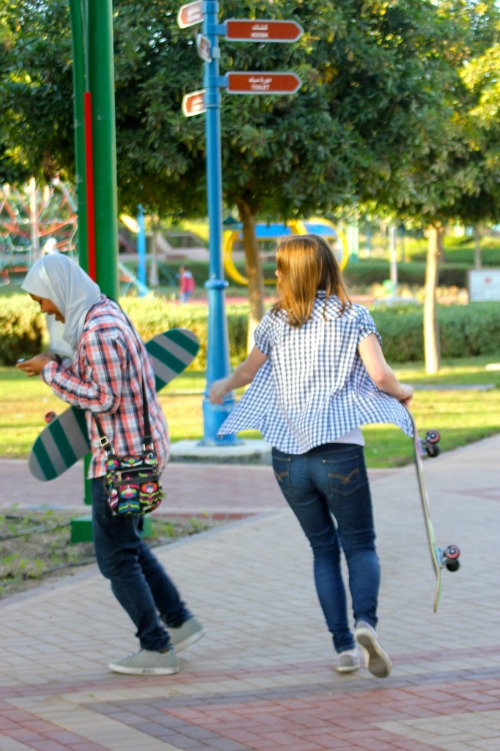
In March, I wrote a post in honor of Gloria Steinem’s birthday, in which I mentioned that when Steinem spoke at my college graduation way back in the 1980s, my friends and I had wished for a speaker who was more “relevant.” In our innocence, we believed that Steinem had won her fight; we were graduating from a women’s college and thought that fight for gender equality had been more or less won.
More than two decades later, I wish I could say that Steinem was irrelevant and that gender inequality is something we only read about in the history books.
When I wrote that post about Steinem, I was thinking about the Common Core curriculum, which relegates women’s contributions to history to the sidelines. Now, of course, we are all confronted with the horror that’s unfolding in Nigeria, and while the plight of those schoolgirls devastates me, it has become, in my mind, another instance in a long list of the ways in which groups (comprised mostly of men) attempt to score political points by seizing control of women’s lives. As an example, think about the Tea Party conservatives in the US, who prove their conservative bona fides in the United States by voting against support for Planned Parenthood, or Head Start, or universal kindergarten, or…
What is so scary about educating a girl? In the middle ages, accusations of witchcraft were often leveled against women who had amassed too much wealth or land, or who in some way differed from those around them. We teach our children that things like the Salem witch trials happened because “people didn’t know better” or because of “mass hysteria” but sometimes I wonder how far we have progressed since those days. What happens to women who challenge the status quo–or who have the potential to challenge the status quo? Don’t they still run the risk of being punished, whether literally or figuratively?
It’s funny to me now, but when I first moved to Abu Dhabi the two most obvious indications that we’d left Manhattan behind—besides the searing heat—were the adhan and the abaya-clad women: religion and covered bodies. I found the abayas more unsettling than the call to prayer, even as I sometimes envied the women their public invisibility. The longer we live here, however, my perceptions have changed so that I no longer see hijab as an automatic symbol of oppression or subjugation or second-class citizenry.
I would imagine, however, that as women here, we’ve all had moments where we’ve felt marginalized, silenced, lesser: the day I trotted down the sidewalk to get in a waiting cab and the cab driver chastised me by saying “women should not run, madam, I will wait, and you should walk.” Or when a guard at the border crossing into Oman looked over at the passenger seat where I was sitting (in long trousers) with one foot propped on the dashboard and told me “to put my foot down, sit like a lady, more properly, sit properly.” When that happened my first impulse was to laugh: surely he couldn’t be serious? But, of course, he was serious. I put both feet on the floor and looked at the map so that I didn’t toss out a few well-chosen swear words. (A general rule regardless of where you are: don’t swear at anyone, male or female, who is wearing a uniform at a border crossing.)
So yes, in that instance, I was silenced as I suppose I was by the cab driver too, who took it upon himself to offer some unsolicited advice. And yes, there is now a slight internal pause before I leave the house as I run through a kind of inner checklist about what I’m wearing: if short sleeves, a long skirt or pants, or vice versa (long sleeves, shorter skirt or shorts); do I have a shawl (equally for frigid air conditioning and bare shoulders); if I’m going to the beach, I make sure that my beach cover-up is more than a ratty t-shirt. There are days where I know I’ve failed the checklist and am too busy or late to care, but overall, I dress more modestly now than I used to and probably that’s not a bad idea: no one needs to see a fifty-year-old woman slopping down the street in cut-off shorts and a tank top.
Am I being repressed, or respectful? Does my feminism mean that I yell at the cabbie, keep my foot defiantly on the dashboard, saunter down the street in a halter top and tight jeans? Or, alternatively, does feminist politics remind us that silencing and the policing of women’s bodies happens—sadly—in almost every culture in the world, including the US? Without making light of the specifics of being female in this region, I’ve come to think of the issues facing women in this part of the world as being differences in degree, not kind, from the problems facing women in other parts of the world.
What do we, as women, do to help other women and girls find their voices–find our own? How do we create strength to silence those who would silence us?
This is an original post to World Moms Blog by Deborah Quinn in the United Arab Emirates of “Mannahattamamma.”
After twenty-plus years in Manhattan, Deborah Quinn and her family moved to Abu Dhabi (in the United Arab Emirates), where she spends a great deal of time driving her sons back and forth to soccer practice. She writes about travel, politics, feminism, education, and the absurdities of living in a place where temperatures regularly go above 110F.
Deborah can also be found on her blog, Mannahattamamma.
More Posts
Follow Me:


by World Moms Blog | May 20, 2014 | 2014, Awareness, Girls, Government, Human Rights, Humanitarian, International, Social Good, Social Media, World Moms Blog
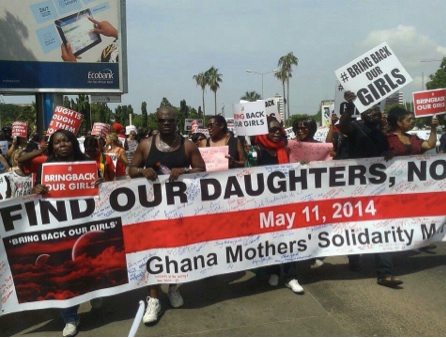
As a mother, it is really hard to see other mothers go through certain challenges. I think it’s in me to be supportive in whichever way that I can when there is something I can do about a situation….like the hundreds of Nigerian schoolgirls who have been kidnapped; I marched to show my support on Mother’s Day.
Every mother’s dream is to see her children have the best in life, which includes education. A famous quote by renowned Ghanaian educationist Dr James Kwegir-Aggrey is:
“if you educate a man you educate an individual, but if you educate a woman you educate a whole nation”
This describes the power of educating young girls. It is every girl’s right and boys too to have an education but when these dreams are shattered it becomes a concern to all. Everyone knows the power of education, and it is evident that when a child is educated, he or she is set on the path to greatness.
‘Education is the most powerful weapon which you can use to change the world’- Nelson Mandela.
Taking these girls away from school is like taking them away from their paths to greatness. We hope and pray that they are returned safely to their families. This is why mothers of Ghana joined the campaign to #BringBackOurGirls on this past Mother’s Day in Accra. It was a solidarity march to present a petition to the Nigerian high commissioner in Ghana organised by Yasmeen. A mother herself, she is a songstress with a golden voice and a concerned citizen of our continent Africa. You can listen to her here .
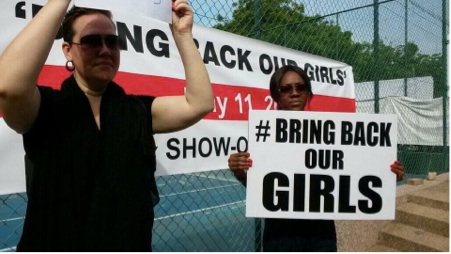
Mother’s Day is no fun if you know that another mother is grieving over her lost child. This was a great initiative by a group who care to march in solidarity in support of the kidnapped Nigerian school girls of Chibok. I saw the post on twitter and immediately wanted to be a part of this great cause. Thank you Yasmin for organising this!
It was an experience for both the young and the old as the children and babies were not left out. There were placards for everyone with ‘Bring Back Our Girls’ boldly inscribed on them. The media was present to cover the event, and the police were also there to ensure the safety of all who came for the walk.
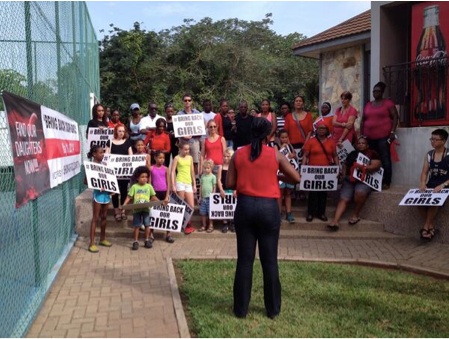
Almost everyone who came wore black and red to signify solemnity. Signatures were also appended on a banner which was later presented to the high commissioner. The walk was through some parts of the capital city of Ghana to the Nigerian High commissioner’s residence. It was such a solemn march and the support was so immense. As mothers everywhere are celebrated this month, let us not forget the ones who are heartbroken over their missing girls.
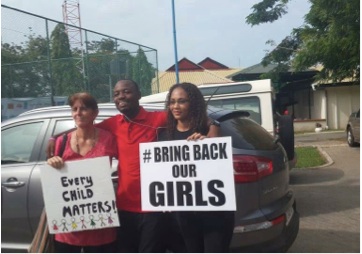
My heart aches each time I think of these girls or see a post about #BringBackOurGirls. We will not relent but continue to pray for the safety of the girls, their families and especially their mothers!
This is an original post written by Adwoa Gyimah of Ghana for World Moms Blog. Photo credits: Adwoa Gyimah
What more can we do to #BringBackOurGirls !?
World Moms Blog is an award winning website which writes from over 30 countries on the topics of motherhood, culture, human rights and social good. Over 70 international contributors share their stories from around the globe, bonded by the common thread of motherhood and wanting a better world for their children.
World Moms Blog was listed by Forbes Woman as one of the "Best 100 Websites for Women 2012 & 2013" and also called a "must read" by the NY Times Motherlode in 2013. Our Senior Editor in India, Purnima Ramakrishnan, was awarded the BlogHer International Activist Award in 2013.
More Posts

by Jennifer Burden | May 19, 2014 | 2014, World Moms Blog, World Motherhood
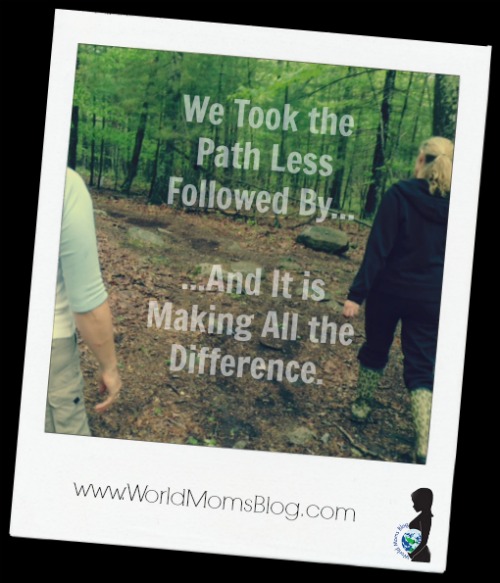
This weekend World Moms Blog editors met in person and on Skype to work on our organization’s strategic plan. Senior Editor, Elizabeth Atalay of Documama, hosted Kyla P’an of Growing Muses and myself in Rhode Island, USA, where we had a packed agenda full of brainstorming, organizing, meetings and calls with our international counterparts around the world.
Before we had even put the pedal to the metal and got started, we received news from India that our site had been featured in the Times of India on Mother’s Day and topped the list of online resources for mothers. That was the perfect morning rally we needed going into a full day of strategic planing and global meetings!
First, Kudos to Senior Editor, Kyla P’an, who made us peg down a weekend for the planning session. Kyla joined World Moms Blog as an editor in 2011 when I went on “maternity leave” with my, now, 3-year old. Like Senior Editors, Eva Fannon, Kirsten Doyle and Purnima Ramakrishnan, she’s been editing weekly with us ever since. To have such a rock solid, committed team behind our site has been critical for our survival…and our sanity. 🙂
We started off our retreat on Friday night with a bonding dinner at an amazing vegetarian restaurant in Providence Rhode Island, The Grange, and toasted to our well-planned agenda for the next day!
In the morning, we got an exciting, motivational phone call in to fellow editor, Nicole Melancon in Minnesota, USA. And then, Elizabeth and her beautiful golden lab, led us on a hike in the woods. After our blood was flowing, we headed back (ok, rushed to make our 10 o’clock!) to Elizabeth’s house for the first of our planned meetings and vision boarding.
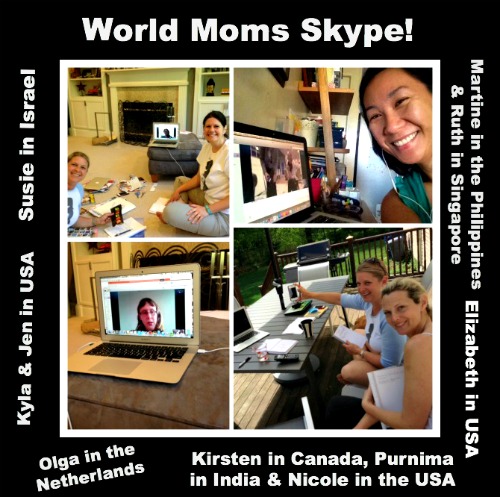
Coming out of the weekend with clear objectives seemed to unleash a whole new upper level of excitement we have for running this organization. And being able to share our ideas with the editing team and getting all the contributors involved in our planning felt very democratic, a reminder of how much of a global movement World Moms Blog is.
In the late afternoon, we took a break in between calls for an inspiring walk near the Atlantic and then out for an early dinner. Then back to work on our evening calls with our editors in Asia, who had already begun their Sunday morning. The energy that all of the women around the world have brought to this strategic planning effort has humbled me. If things couldn’t get even more global, Kyla, Elizabeth and I ended the evening by watching “Baraka”, a wordless documentary on culture around the world from the 1990s.
Before we parted ways on Sunday morning, we glued the final pieces on our vision board and had an in-person meeting with Meg Wirth from Maternova, a company that helps get the products mothers need to increase maternal health worldwide. Online, we know Meg well from her support of our 8 month #Moms4MDGs campaign, and it was great to be able to sit down with her over a cup of coffee and hear more about her life, her passion and how Maternova came to be. Did you know they’ve made an impact in the lives of over 115,000 mothers in over 35 countries? (Interview with Meg to come!)
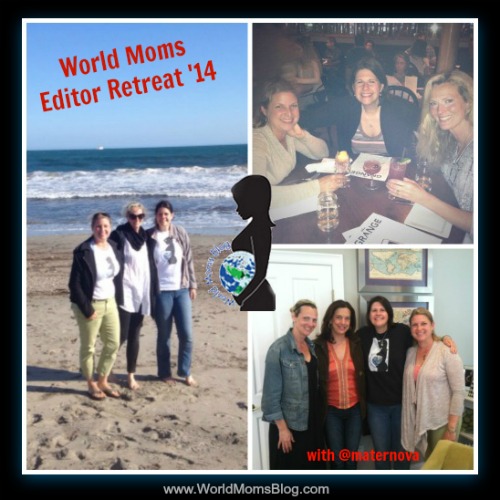
Alas, I boarded my train back to New Jersey with our vision board in tow. Now that we’ve set our goals and objectives, we certainly have our work cut out for us. And, without revealing any specific, amazing plans until they’re ready to be unveiled to the world, there will be some exciting changes and projects in the pipelines, so do keep up to date with World Moms Blog!
Want to stay up to date with World Moms Blog? Head over to our right sidebar to fill out the form for our newsletter — you may even win a World Moms Blog tote bag during our next mailing!
This is an original post to World Moms Blog by Founder, Jennifer Burden of New Jersey, USA.
Photo credits to World Moms Blog.

Jennifer Burden is the Founder and CEO of World Moms Network, an award winning website on global motherhood, culture, human rights and social good. World Moms Network writes from over 30 countries, has over 70 contributors and was listed by Forbes as one of the “Best 100 Websites for Women”, named a “must read” by The New York Times, and was recommended by The Times of India.
She was also invited to Uganda to view UNICEF’s family health programs with Shot@Life and was previously named a “Global Influencer Fellow” and “Social Media Fellow” by the UN Foundation. Jennifer was invited to the White House twice, including as a nominated "Changemaker" for the State of the World Women Summit. She also participated in the One Campaign’s first AYA Summit on the topic of women and girl empowerment and organized and spoke on an international panel at the World Bank in Washington, DC on the importance of a universal education for all girls. Her writing has been featured by Baby Center, Huffington Post, ONE.org, the UN Foundation’s Shot@Life, and The Gates Foundation’s “Impatient Optimists.” She is currently a candidate in Columbia University's School of International and Public Affairs in the Executive Masters of Public Affairs program, where she hopes to further her study of global policies affecting women and girls.
Jennifer can be found on Twitter @JenniferBurden.
More Posts - Website
Follow Me:


by Roxanne (USA) | May 16, 2014 | 2014, Communication, Family, Inspirational, Life Lesson, Motherhood, Parenting, Rox is Brilliant, Single Mother, Unintentionally Brilliant, USA, Womanhood, Working Mother, World Motherhood
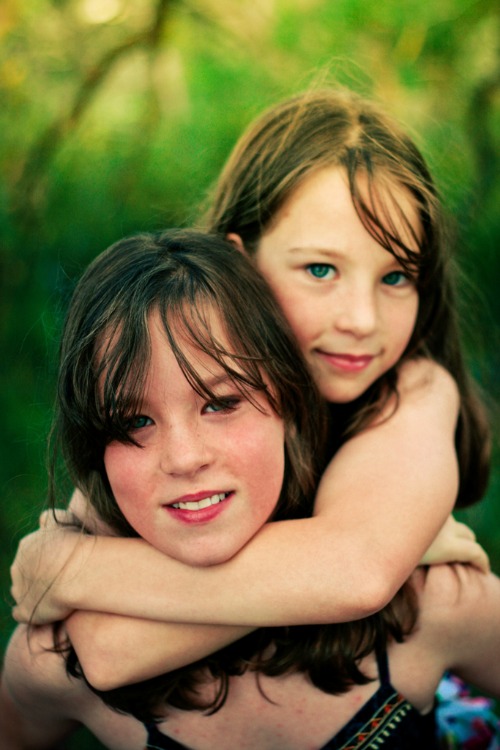 My extended family on my dad’s side is huge. My dad had a bunch of sisters and a brother, and they’ve all gotten married and had babies and all of their babies are getting married and having babies. My oldest cousin is in her 40s; the youngest is in her early 20s. The oldest of the cousin’s children is 17 and the youngest is…just a couple weeks old.
My extended family on my dad’s side is huge. My dad had a bunch of sisters and a brother, and they’ve all gotten married and had babies and all of their babies are getting married and having babies. My oldest cousin is in her 40s; the youngest is in her early 20s. The oldest of the cousin’s children is 17 and the youngest is…just a couple weeks old.
Growing up, one set of cousins lived particularly close to where we lived. J is almost exactly 10 years older than me, and his sister V is 8 years older. They both used to babysit my siblings and I, but I mostly just remember V. She would take us on the bus when we left the house. She was a cheerleader, and when I got a little older she was my cheer coach.
In all honesty, she was basically my big sister. I looked up to her in a way I wished my little sister would look up to me. I still do.
Recently I had a mini breakdown at a family event and I ended up closing myself in a bedroom for a while to have a good cry. I just needed to get it out to be done with it and move on. It was the only way I could deal with all of the emotions I had been feeling.
V came to me to talk. It was a little bit of a relief when she admitted to me that she doesn’t have everything together. She made me realize that it’s all right for me to not have it all together at 30. People have been telling me this, but V saying it–for some reason–really made it click. I have looked up to her for so much of my life, and what I could see always looked like she really knew what she was doing. For her to admit even the smallest imperfection meant a lot to me.
Not because I feel better that she’s imperfect, but because she made it okay for me to be imperfect. She made it okay for me, and I’m here to tell you that it’s okay for you. It’s okay if you don’t have it all together. Nobody does. We’re all just doing the best we can with what we’ve got. And what more could we ask for?
Do you ever feel like you don’t quite have it “all together”? How have you dealt with the emotions you have felt?
This is an original post to World Moms Blog by Roxanne of Nevada, USA. You can find Roxanne at her editorial website, RoxannePiskel.com, and her personal blog, Unintentionally Brilliant.
Photo credit to Lina Hayes. This photo has a creative commons attribute license.
Roxanne is a single mother to a 9-year-old superhero (who was born 7 weeks premature), living in the biggest little city and blogging all about her journey at Unintentionally Brilliant. She works as a Program Coordinator for the NevadaTeach program at the University of Nevada, Reno. Roxanne has a B.A. in English from Sierra Nevada College. She has about 5 novels in progress and dreams about completing one before her son goes to high school.
More Posts - Website
Follow Me:



by Sarah Sensamaust | May 14, 2014 | 2014, Africa, Being Thankful, Cultural Differences, Expat Life, Family, Living Abroad, Motherhood, Parenting, Relocating, Stress, World Moms Blog
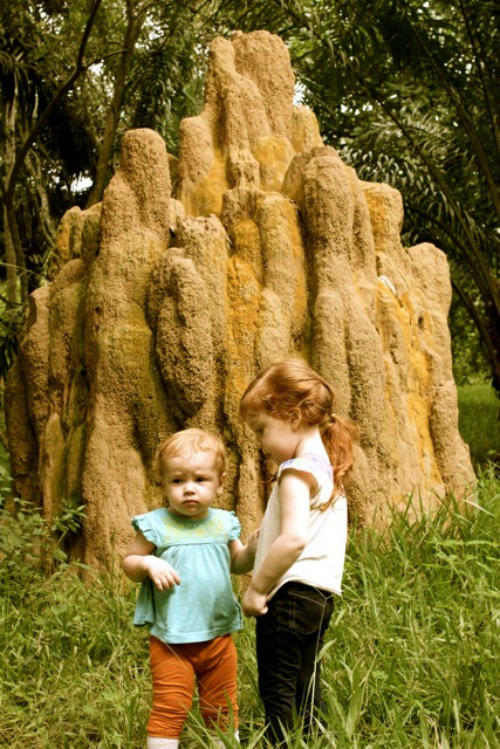
That’s a termite mound, not a rock!
I’ve reached a time in my life when it’s easy to be anxious about so many things. I think that most mothers of small children, whether living abroad or not, are often plagued by the anxiety bug.
For the last six years, my family and I have lived in Congo and we’re moving away in just a few weeks. I find myself thinking back to all those worries, big and small, that I had about raising two kids in the proverbial “heart of darkness.”
So as an exercise of gratitude and reassurance before we begin our next African adventure, I’ve been reflecting on all the what-ifs –real and imagined – that never came true.
Those mosquito bites never led to malaria.
There were no broken bones, stitches or other ailments that couldn’t have otherwise struck us in the United States.
Getting stopped by the police was never more than a hassle and a good story.
Our girls made it to and from school every day without incident.
We never ran out of quality disposable diapers, Sensodyne toothpaste, or anything else we hoarded from home.
My shoes held up.
Every fever went away without too much suffering.
Nothing was ever stolen (that we noticed).
No one was bitten by a snake or spider and a few worms in the feet were no big deal.
The termites never swarmed and carried our children away.
The vehicles always returned to their respective lanes before a head-on collision.
No one was lost in an angry mob.
We never got sick from all that “questionable” food.
That crazy Congo lightning never came through our window and zapped me in my bed.
Both of my pregnancies were picture perfect.
The electricity always came back on.
The water always returned.
The internet was always repaired.
The planes did not crash.
We made friends. Good, lifelong friends.
And no one is worse for the wear.
As infinitely grateful as we are for all these things that never happened, we’re even more so for everything that did. We had two beautiful children, our family learned a new language and we reached far out of our comfort zone. We will forever be connected to the culture and people we grew to love in Congo.
I hope that the next time everyday stressors take over, I’ll be able to stop and think about this list and remember more often than not everything is alright in the end.
What things have you worried about that never ended up happening?
This is an original post written for World Moms Blog by Sarah Sensamaust. You can find Sarah blogging with Jill Humphrey at Mama Congo.
Photo credits to the author.

by Elizabeth Atalay | May 13, 2014 | 2014, Economy, Education, Environment, Ethiopia, Girls, Government, Health, Human Rights, Humanitarian, International, Maternal Health, Natural Disaster, Poverty, Social Good, Vaccines, World Moms Blog
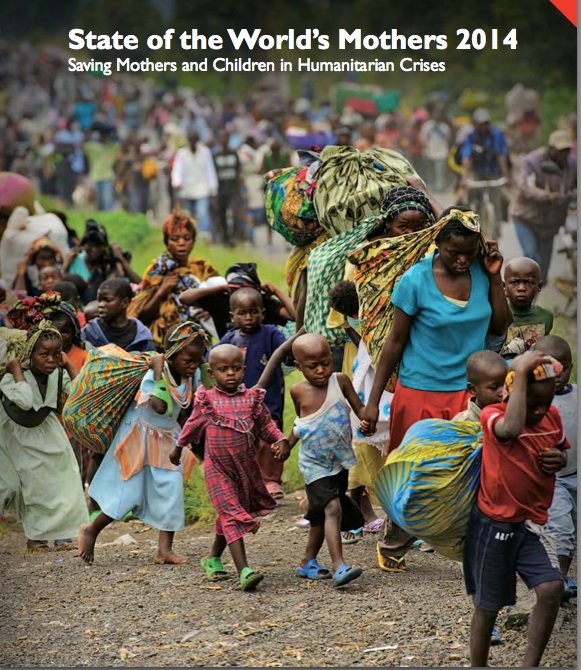
State of the Worlds Mothers Report Cover Photo By Phil Moore
The 15th annual State of the World’s Mothers Report was released last week by Save The Children, just in time for Mother’s Day, and World Moms Blog was there at the launch. The focus of the 2014 report is on saving mothers in humanitarian crisis, and the launch of the report in New York City was co-hosted by the Permanent Mission of the Philippines to the United Nations. In his welcome address to the room Permanent Representative H.E. Mr. Libran Cabactulan of the UN Mission of the Philippines acknowledged from first hand experience, that women and children suffer the most in crisis situations.
The report notes that worldwide women and children are up to 14 times more likely than men to die in disaster. In fact it is no surprise that also according to the report more than half of all maternal and child deaths world-wide take place in countries suffering conflict or natural disasters. As Werner Obermeyer, Deputy to the Executive Director of the WHO office to the UN stated, It is not the armed component in conflicts we are worried about, it’s those who are suffering from the armed component.
The purpose of the annual report is to further the mission of Save The Children in protecting the worlds most vulnerable mothers and children. The State of the World’s Mothers report does so by highlighting where we are failing, what effective solutions need to be put in place, and recommended policy changes towards progress. Despite the fact that 80% of the countries are not on target for achieving MDG 4 and 5, maternal and child health goals, the extreme progress seen in other countries previously failing, tells us that it is possible.
Ethiopia for example has reduced its risk of maternal death more than any other African country, by nearly two-thirds. H.E. Mr. Tekeda Alemu of Ethiopia stated that the progress there was due to a well crafted policy based on the participation of people on the local level. 48,000 health extension workers were fanned out throughout the country to mobilize women volunteers in what they called the Women’s Development Army to reach remote villages. Afghanistan has also cut maternal death rates by 60-70 percent, moving up 32 places on the Mothers’ Index Rankings of the best and worst countries in which to give birth. This proves that the combined investment of minds and funding works. If these countries with terrible track records have been able to make such significant improvements, there is no reason we can not see this type of progress universally with proper programs and support.
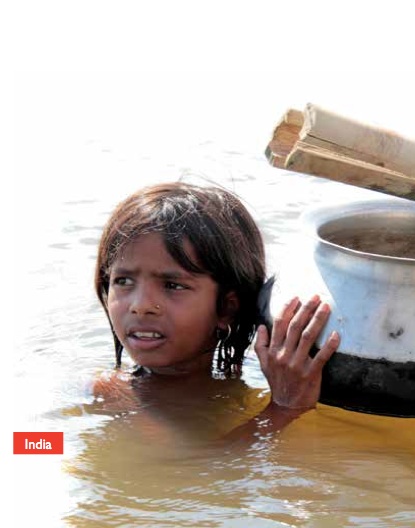
Photo Credit: Save The Children
Climate change is the wild card that threatens even the countries that have made the most progress in maternal and child health. Climate related disasters and extreme weather are factors that can cause severe set backs in development.
The recommendations of the report call for a collaboration between governments, donor countries, international organizations, private sector and civil society to take responsibility, and each do their part to ensure mothers, and children in crisis situations have the best chance to survive, and thrive. Here is what we need to do:
1. Ensure that every mother and newborn living in crisis has access to high quality health care
2. Invest in women and girls and ensure their protection
3. Build longer term resilience to minimize the damaging effects of crises on health.
4. Design emergency interventions with a longer term view and the specific needs of mothers and newborns in mind.
5. Ensure political engagement and adequate financing, coordination and research around maternal and newborn health in crisis settings.
Save The children’s 15th annual State of the Worlds Mothers report comes at a pivotal moment in history, when humanitarian crises have focused a spotlight like never before on the needs of mothers and children who are struggling to survive. With record numbers of people displaced by war and conflict and increasingly severe natural disasters causing unspeakable destruction, it is clear we must do more to help the worlds poorest and most vulnerable families. We must give mothers the support they need to keep their children safe and healthy, even in the darkest times. -Carolyn Miles, President and CEO of Save The Children USA
You can read the State of the Worlds Mothers report in full here. See where your country falls on the Mothers’ Index Rankings here.
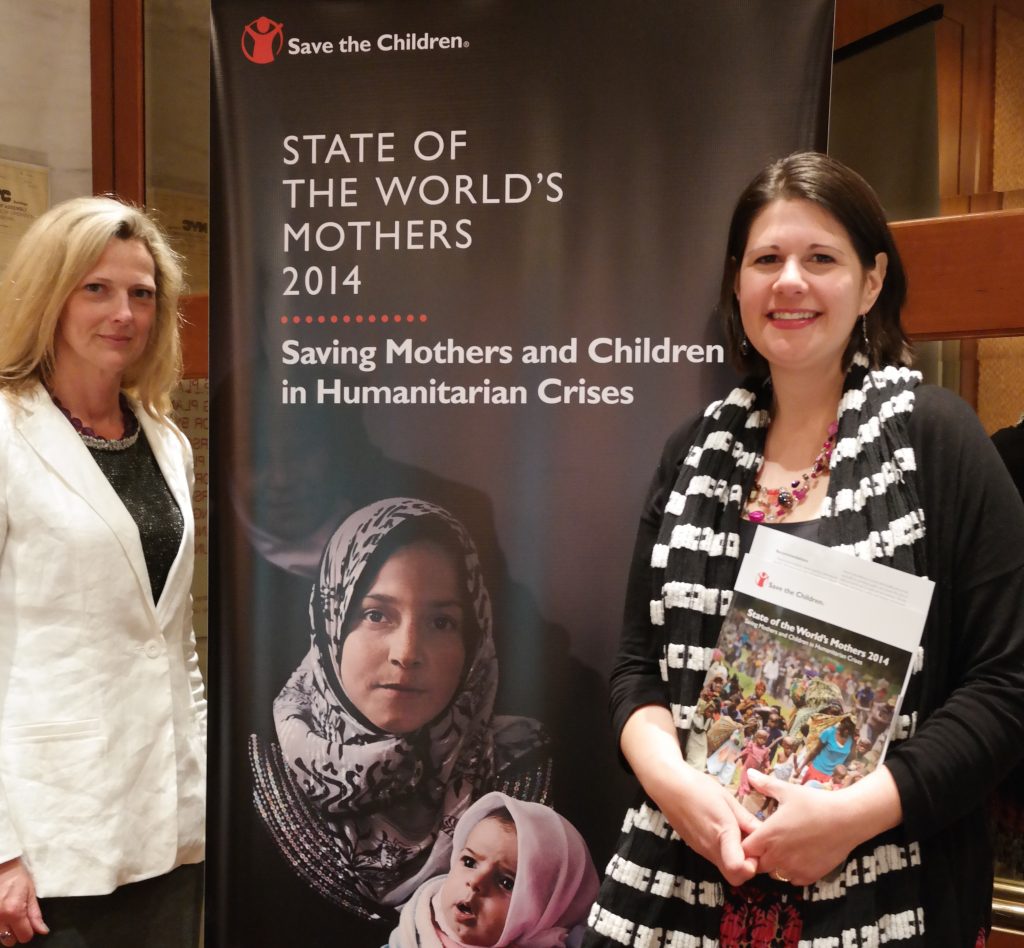
World Moms Blog Founder Jennifer Burden and Senior Editor Elizabeth Atalay at the State of the Worlds Mothers report launch in NYC.
This is an original post written for World Moms Blog by Elizabeth Atalay of Documama.

Elizabeth Atalay is a Digital Media Producer, Managing Editor at World Moms Network, and a Social Media Manager. She was a 2015 United Nations Foundation Social Good Fellow, and traveled to Ethiopia as an International Reporting Project New Media Fellow to report on newborn health in 2014. On her personal blog, Documama.org, she uses digital media as a new medium for her background as a documentarian. After having worked on Feature Films and Television series for FOX, NBC, MGM, Columbia Pictures, Warner Brothers, 20th Century Fox, and Castle Rock Pictures, she studied documentary filmmaking and anthropology earning a Masters degree in Media Studies from The New School in New York. Since becoming a Digital Media Producer she has worked on social media campaigns for non-profits such as Save The Children, WaterAid, ONE.org, UNICEF, United Nations Foundation, Edesia, World Pulse, American Heart Association, and The Gates Foundation. Her writing has also been featured on ONE.org, Johnson & Johnson’s BabyCenter.com, EnoughProject.org, GaviAlliance.org, and Worldmomsnetwork.com. Elizabeth has traveled to 70 countries around the world, most recently to Haiti with Artisan Business Network to visit artisans in partnership with Macy’s Heart of Haiti line, which provides sustainable income to Haitian artisans. Elizabeth lives in New England with her husband and four children.
More Posts














 My extended
My extended 









